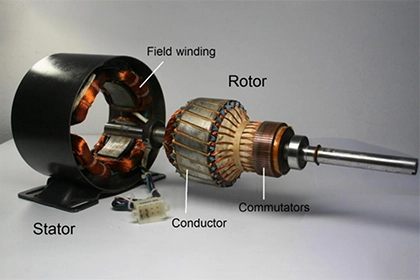
How the development of new motors makes EV more attractive
With the policy requirements of sustainable green development and the development of the motor industry, people are paying more and more attention to electric vehicles.
As the global demand for electric vehicles continues to rise, the development of electric motors for electric vehicles has been a major focus of industry attention. According to a report by the International Energy Agency, global electric vehicle sales are expected to reach 10 million by 2025 and 30 million by 2030. The growth in demand for electric vehicles is driven by the need to reduce carbon emissions and move away from fossil fuels.
The automotive industry has undergone significant changes in recent years, particularly in the development of electric vehicle (EV) propulsion systems. As the demand for sustainable transportation continues to grow, the focus has been on improving the efficiency, cost, and size of EV motors.
The future will be electric, and at the 2023 Consumer Electronics Show (CES), Infinitum, creator of the breakthrough hollow motor, announced that it will introduce Aircore Mobility, a next-generation motor that will power commercial electric vehicles, as well as aerospace, marine, construction, agricultural machinery, and other applications. The Aircore motor is said to increase the efficiency of electric vehicles by up to 10 percent and save costs. In addition, it is 50 percent smaller and lighter than conventional motors, resulting in more compact and lighter electric vehicles. This is a significant advance, as the size and weight of the motor are key factors in determining the overall efficiency and performance of an electric vehicle. This next-generation motor is expected to be available in the second quarter of 2023.
Lunyee also has years of R&D and production experience in the motor industry, especially AC Motor is trusted and repurchased by many customers. In addition, Lunyee is still upgrading new motors based on customer feedback.
The electric vehicle industry still has great potential for growth
In recent years, many of the industry's leading automotive brands have been gradually turning to electric vehicle development. Japan's Suzuki Motor Corporation (SMC) plans to learn from partner Toyota Motor Corp. how to use EV technology to build small electric vehicles, according to a Reuters report on Jan. 11. Suzuki said it is learning about electric vehicles and other technologies from Toyota, to develop vehicles that are more in line with its products. In addition to Suzuki, in 2022 several established automakers such as Mercedes, Ford, and General Motors introduced dozens of new electric vehicles, most of which will go into mass production for sale starting in 2023 or 2024.
Since electric vehicles first entered new car showrooms a decade ago, the electric vehicle industry has been an emerging industry that has begun to grow, especially in recent years, with several countries across the country promoting the electric vehicle industry, and European countries and California have set 2035 as the deadline for ending sales of new internal combustion engine passenger vehicles. The motor industry is likely to continue to evolve and innovate over the next few years and will be driven by the need to improve efficiency, reduce costs, and make lighter-weight models. This will help drive the growth of the electric vehicle market and promote the adoption of renewable energy and automation technologies.
The development of new motors can also promote the development of other industries
Developing more efficient and cost-effective motors not only contributes to the electric vehicle market but also promotes growth in other industries such as renewable energy, automation, and robotics. For example, more efficient and cost-effective motors help make wind and solar more competitive than fossil fuels and enable robotics and automation in broader applications.
Conclusion
The automotive industry is undergoing rapid changes centered on electric vehicles. Many companies are trying to develop more efficient, cost-effective, and smaller motors. This advance in motor technology not only contributes to the electric vehicle market but also contributes to the growth of other industries such as renewable energy, automation, and robotics. The automotive industry is expected to continue to grow and innovate in the coming years.



Leave a Comment